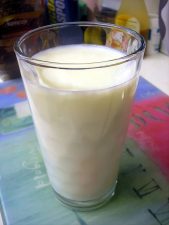
Are soy products increasing women’s health risks? Miriam takes up the debate.
Hannah’s thoughtful post on increased breast size in modern women made me think of the effect of soy on hormone stimulation. The theory that genetically-modified, unfermented soy products stimulate estrogen flow production is gaining ground, paired with what we know about GM foods’ effect on our health in general. See our post on GM foods’ effects on fertility and sexual health.
This disturbing study on GM foods from the Institute for Responsible Technology site may be a fresh eye-opener, but others are aware of changes in world health due to diet. An article on the Museum of Menstruation and Women’s Health shows that today’s girls enter puberty six months earlier than their mothers did and mentions the presence of phyto-estrogens in today’s food. I became interested in the effect of soy on health when my children’s pediatrician told me she had patients nine years old who were already menstruating. My curiosity was piqued further when two mothers of young girls told me that their daughters had adult-sized breasts at the age of nine. All the children regularly ate soy “shnitzels,” patties of compressed soy protein boosted with fat and flavorings.
Obviously, more than one factor is at play in precocious maturation. Soy is only one possibility. Although it seems likely that soy-based baby formulas in China contribute to premature breast growth, more studies are needed to support the idea. We do know that body fat, genetics, hormones absorbed from food, even hotter world temperatures, and other factors, play roles in human maturation.
And yet. Consider how much GM soy is present in foods you pick up at the supermarket. Starting from baby formula (and we know that breast is best), some form of soy is present in about 60% of processed foods. At my local grocery store, even frozen ground beef has “vegetable protein” – soy – in it. Soy is popular with industrial food producers as a filler because it’s cheap and its taste can be altered to imitate popular flavors. Kids love soy shnitzels, especially slathered with ketchup.
GM considerations apart, it’s now known that unfermented soy foods depress thyroid function. Nowadays I allow only organic fermented soy products in my kitchen: tempeh, miso, and soy sauce. Tofu is an occasional ingredient – it’s only partly fermented. The great creators of artisan soy foods, the Japanese and Chinese, themselves eat tofu only in small quantities and not every day.
For those reading this, I urge you to search food labels for the presence of soy and to choose your food consciously.
More on GM foods from Green Prophet:
Is Egypt Back-Tracking on GM Crops Ban?
Genetically Modified Hype in Israel
Photo of Iced Soy No-Whip White Chocolate Mocha by fuzzcat via Flickr.
:: Institute for Responsible Technology
:: Museum of Menstruation & Women’s Health



What I’ve read is that the main cause of advanced puberty is the hormones in milk and meat. Is there any research trying to discriminate between the effects of soy and the effects of hormone-laced dairy and meat products?
I haven’t seen any; but to be cautious we should buy organic meat if you eat it, and mix up proteins with alternatives like seitan and lentils, chickpeas etc.
Great segway article to the one on breasts getting bigger over the past 50 years. Scary? Eye-opening? Food for thought…